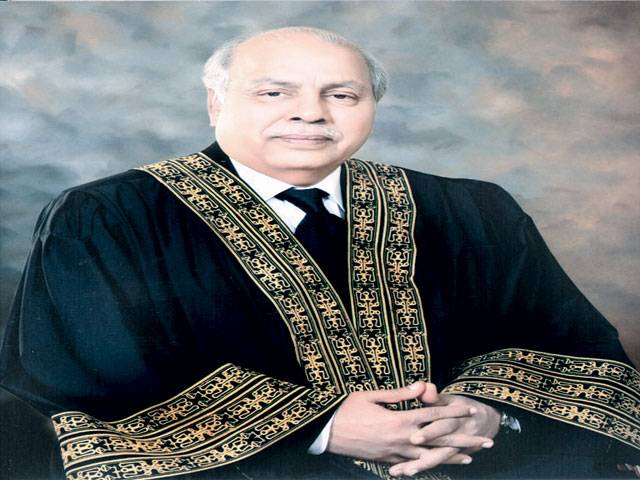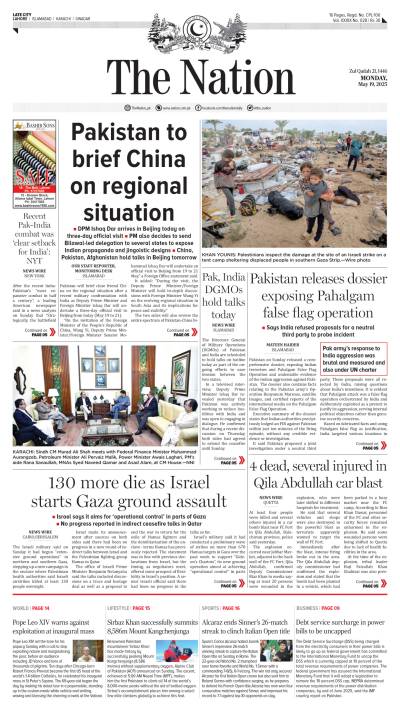ISLAMABAD - The Supreme Court of Pakistan on Tuesday issued notices to the Advocate General of Gilgit-Baltistan (GB) on the petition to permit the federal government to make necessary amendments in the Government of GB Order 2018 to establish a caretaker setup for conducting elections for the GB Assembly.
A seven-member bench of the apex court headed by Chief Justice of Pakistan Justice Gulzar Ahmed conducted hearing of the federal government’s petition to allow it to make necessary amendments in the Government of GB Order 2018. The government also argued that it be allowed to adapt the Election Act, 2017, and the Rules/Regulations made thereunder.
After issuing the notices, the apex court deferred hearings till April 30 for further proceedings. Tenure of the incumbent G-B government will expire on June 24
The top court of the country had directed the federal government through a January 17, 2019 judgment to promulgate the Proposed Order pertaining to the status, authority and powers of GB including the judiciary and the rights available to its people forthwith or within a fortnight. However, the PTI government sought time on May 13, 2019 to implement Proposed Order.
The judgment said that the Proposed Order (modified in the manner as noted in the judgment), shall be forthwith promulgated by the President on the advice of the Federal Government, and in any case within a fortnight.
The judgment authored by CJP Saqib Nisar said that no amendment shall be made to the Order as so promulgated except in terms of the procedure provided in Article 124 of the same, nor shall it be repealed or substituted, without the instrument amending, repealing or substituting the same being placed before this Court by the Federation through an application that will be treated as a petition under Article 184(3) of the Constitution.
It added that nothing in the judgment shall be construed to limit the jurisdiction conferred on this Court by the Proposed Order itself; and if the Order so promulgated is repealed or substituted by an Act of Parliament the validity thereof, if challenged, shall be examined on the touchstone of the Constitution.
The judgment said that the Proposed Order (or any previous or subsequent such Order) can be challenged by, inter alia, the people of Gilgit-Baltistan, but only before this Court, either under Article 184 of the Constitution or in the manner herein after provided.
The judgment said that nothing this Court recommends or orders should affect the nature and status of the Kashmir issue. “It must be emphasized that all the measures and directions taken and given must be predicated by the caveat that these are subject to the result of the plebiscite, which is duly recognized in Article 257 of the Constitution of the Islamic Republic of Pakistan, 1973,” said the judgement.
It further said that as a responsible member of the comity of nations Pakistan remains aware of its obligations in such terms. As and when the promised plebiscite is organized by the parties to the dispute, it will be up to the people of all of Jammu and Kashmir, and of Gilgit-Baltistan, to make their choice.
Till then, it is surely incumbent upon both India as well as Pakistan to ensure that the people of this region enjoy maximum rights for areas within each country’s control. Therefore, till such time that the plebiscite is held, a proper arrangement must be provided for by Pakistan for the people of Gilgit-Baltistan for purposes of governance within a framework of a constitutional nature, including most importantly the enjoyment of fundamental rights.
It noted that in 1999 in Al-Jehad Trust (1999 SCMR 1379) apex court had directed the federal government to extend fundamental freedoms to the Northern Areas (now Gilgit-Baltistan) within six months.
The Al-Jihad judgment had declared that Pakistan exercised both de facto and de jure administrative control over the Northern Areas. It ruled in that case that the people of the region were “citizens of Pakistan for all intents and purposes...and could invoke constitutionally guaranteed fundamental rights.” It also emphasized that the people of the Northern Areas were “entitled to participate in the governance of their area and to have an independent judiciary to enforce...Fundamental Rights.”
The judgment said that they have considered what would be the position (i.e., status, powers and jurisdiction) of the judicial, legislative and executive organs established by an instrument of the Gilgit Baltistan Order, 2018.
In accordance with well-established principles of law, the Gilgit-Baltistan legislature would only have such powers as are conferred upon it by the Federation through the Proposed Order.
The courts created by such Order shall have the power to judicially review the laws enacted by such legislature. Of course, the organs created by the Proposed Order (or any previous or subsequent such Order), and especially any legislative body, would be bound not merely by the Order, but also by the Constitution.
The jurisdiction of a Gilgit-Baltistan court established by or under the Proposed Order is confined to the territory of Gilgit-Baltistan. Therefore, it is concluded that the intention was, and is, to give the Gilgit-Baltistan Supreme Appellate Court and the Chief Court the status of a “constitutional” court within the ambit of Gilgit-Baltistan and the Proposed Order.
The Gilgit-Baltistan Courts do not, and will not, sit as courts having the power of judicial review in respect of the territory of Pakistan, nor can they declare Orders made or legislation passed by the President or the Parliament as ultra vires, nor can they initiate judicial review of departments working outside of Gilgit-Baltistan.






